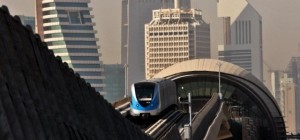By Essam Al Ghalib www.thenational.ae
Commuters and residents are looking forward to the opening of the long-awaited Jebel Ali Metro station on Friday, which is intended to alleviate long and often delayed commutes and increase access to the rest of the city.
 The station will provide trains to and from the Jebel Ali Free Zone every five to eight minutes during peak hours, the Roads and Transport Authority (RTA) announced this weekend. It will serve 40,000 employees living inside the Free Zone and another 129,000 working at 6,600 businesses located there, according to the RTA.
The station will provide trains to and from the Jebel Ali Free Zone every five to eight minutes during peak hours, the Roads and Transport Authority (RTA) announced this weekend. It will serve 40,000 employees living inside the Free Zone and another 129,000 working at 6,600 businesses located there, according to the RTA.
“We’ve been waiting for this for quite a while,” said Jeff Agsalog, 31, a warehouse worker who lives in Satwa. “Getting to work will be much easier now. Before there were not enough buses serving Jebel Ali so I had to take a taxi to work or get a ride from friends. The new service will help me and many others make it to work on time.”
Another Jebel Ali worker, who lives on-site, said the new station would make the rest of Dubai much more accessible during his free time.
“This is great, great news,” said Fathi Marwan, an Egyptian dock worker. “Now all of Dubai is open. Instead of staying at the port on weekends or taking buses or taxis, my coworkers and I can simply take the Metro and see more of Dubai.”
The latest addition, which marks the end of the Red Line and its 27th station, has been designed to process 11,000 commuters per hour in each direction, according to the RTA.
“The Jebel Ali Station is mainly intended to serve Jebel Ali area and in particular the Jebel Ali Free Zone North and South as well as Jebel Ali Port,” said Mattar al Tayer, chairman of the board and executive director at RTA.
The RTA will operate 27 trains in the morning peak hours, with service every six to eight minutes, and 29 trains in the evening peak hours, with service every five to six minutes.
In January, there were 4.7 million riders, dropping slightly in February to 4.6m. In 2010, there were 38.8m riders recorded by the RTA Statistics Office, with an average daily ridership of 149,000.
















